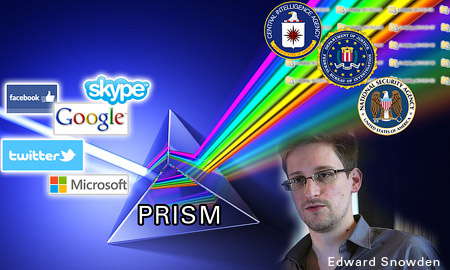Wednesday, June 26, 2013
Under Electronic Surveillance of US Special Services http://www.tiwy.com/news.phtml?id=279
Snowden has not revealed everything he knows as yet, but what has become the public knowledge so far has evoked high alarm, at least in Latin America. If the empire is watching the NATO closest allies, then how far can it go to the south of Rio Grande, the region it considers to be its own «backyard»? There is a huge building without windows in the heart of Miami that belongs to Terremark Company. Three big Global Crossing white domes with electronic equipment are located on the roof. It is used for keeping tabs on phone conversations and Internet messages in Latin America and the Caribbean. Brazil's minister for communications Paulo Bernardo has said the government will ask the United States for explanations about the Internet spying and the role of the American companies. According to him, Google and other majors were to provide explanations to their clients in Brazil and other countries concerning their relationship with US security services. According to him, the media reports pose a great problem related to guaranteeing privacy of Brazilians granted to them by the country’s Constitution. The Brazilian government expresses legitimate concern. The United States started to pay special attention on Brazilian leaders’ private lives, the country’s internal and external policies during the tenure of Bush Jr. Brazil is viewed by the United States as a «South America giant», the major geopolitical rival in the Western Hemisphere, the leading nation of Latin American integration and a loyal partner of Cuba and other «populist regimes». The US embassy in Brazil has been involved in intelligence activities. The US operatives never shied away from recruiting Brazilians on US soil. The first US special services failures took place in 1999-2004 in the days when Rubens Barbosa served as Brazil’s ambassador to the United States. The communications of Brazil’s offices, cell phones of diplomats and auxiliary personnel were intercepted. There have been cases when the bags of Brazilian diplomats were open. According to Brazilian competent sources, the Federal Bureau of Investigation and the Central Intelligence Agency hunted for decoders. Protests against eavesdropping and bags checking have been sent to the State Department, but there has never been a clear response. The Panama’s Democratic Revolutionary Party asked State Secretary John Kerry to explain the details related to the use of surveillance equipment transferred to Panamanian security services. The devices allowed to conduct eavesdropping operations, Internet monitoring and intercept of text messages. The local analysts say the activities are timed with general elections on May 2014 and the desire of the Martinelli’s government to discredit the opposition by using «tarnishing» information. There are also other reasons provided to explain the fact of sharing the top secret equipment, it’s all done in order to deploy the PRISM elements in the Western Hemisphere. Another row has taken place in Argentina. The national police database was under control of US embassy in Buenos Aires. In 2005 Proyecto X 4.1 was acquired from Microsoft to systemize the data related to public activists, political and trade union leaders. According to the contract, Argentinian experts had no right to make changes to the program. This could only be done by special staff in the United States embassy or, in other words, by those who work for the CIA. There are other reasons to believe the Agency used the police computers in order to collect data on other Brazilian law enforcement agencies according to PRISM program. Regional media puts the issue of US eavesdropping high on agenda. On June 6 Gaceta Mercantil.com published an interview with Henoch Aguiar, former Argentinian communications minister, who told how they tried to make him work for the United States. He was invited to meet an American by an Argentine entrepreneur who had close ties with US partners. Having a chat in a restaurant the American he was «recommended to meet» suddenly said he was a high standing CIA official. He put it straight and asked Aguiar to lend him a helping hand in eavesdropping efforts in Argentina. When refused he hurried away.[ed notes:click link for whole article..

No comments:
Post a Comment